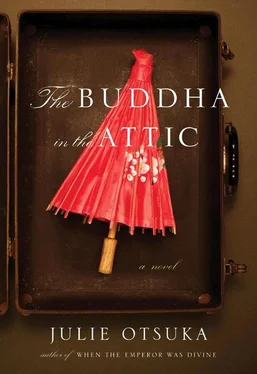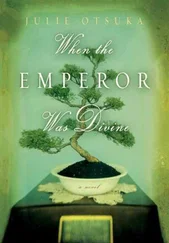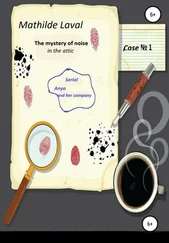Julie Otsuka - The Buddha in the Attic
Здесь есть возможность читать онлайн «Julie Otsuka - The Buddha in the Attic» весь текст электронной книги совершенно бесплатно (целиком полную версию без сокращений). В некоторых случаях можно слушать аудио, скачать через торрент в формате fb2 и присутствует краткое содержание. Город: New York, Год выпуска: 2011, ISBN: 2011, Издательство: Borzoi Book, Жанр: Историческая проза, на английском языке. Описание произведения, (предисловие) а так же отзывы посетителей доступны на портале библиотеки ЛибКат.
- Название:The Buddha in the Attic
- Автор:
- Издательство:Borzoi Book
- Жанр:
- Год:2011
- Город:New York
- ISBN:9780307700469
- Рейтинг книги:5 / 5. Голосов: 1
-
Избранное:Добавить в избранное
- Отзывы:
-
Ваша оценка:
- 100
- 1
- 2
- 3
- 4
- 5
The Buddha in the Attic: краткое содержание, описание и аннотация
Предлагаем к чтению аннотацию, описание, краткое содержание или предисловие (зависит от того, что написал сам автор книги «The Buddha in the Attic»). Если вы не нашли необходимую информацию о книге — напишите в комментариях, мы постараемся отыскать её.
is a tour de force of economy and precision, a novel that tells the story of a group of young women brought from Japan to San Francisco as “picture brides” nearly a century ago.
In eight incantatory sections,
traces the picture brides’ extraordinary lives, from their arduous journey by boat, where they exchange photographs of their husbands, imagining uncertain futures in an unknown land; to their arrival in San Francisco and their tremulous first nights as new wives; to their backbreaking work picking fruit in the fields and scrubbing the floors of white women; to their struggles to master a new language and a new culture; to their experiences in childbirth, and then as mothers, raising children who will ultimately reject their heritage and their history; to the deracinating arrival of war.
The Buddha in the Attic — читать онлайн бесплатно полную книгу (весь текст) целиком
Ниже представлен текст книги, разбитый по страницам. Система сохранения места последней прочитанной страницы, позволяет с удобством читать онлайн бесплатно книгу «The Buddha in the Attic», без необходимости каждый раз заново искать на чём Вы остановились. Поставьте закладку, и сможете в любой момент перейти на страницу, на которой закончили чтение.
Интервал:
Закладка:
IN J-TOWN we rarely saw them at all. We waited tables seven days a week at our husbands’ lunch counters and noodle shops, where we knew all the regulars by heart. Yamamoto-san. Natsuhara-san. Eto-san, Kodami-san. We cleaned the rooms of our husbands’ cheap boardinghouses, and twice a day we cooked meals for their guests, who looked just like ourselves. We bought our groceries at Fujioka Grocery, where they sold all the things we remembered from home: green leaf tea, Mitsuwa soap, incense, pickled plums, fresh tofu, dried seaweed to help fend off goiters and cold. We bought bootleg sake for our husbands at the pool hall beneath the brothel on the corner of Third and Main, but made sure to put on our white aprons first so we would not be mistaken for whores in the alley. We bought our dresses at Yada Ladies’ Shop and our shoes at Asahi Shoe, where the shoes actually came in our size. We bought our face cream at Tenshodo Drug. We went to the public bathhouse every Saturday and gossiped with our neighbors and friends. Was it true that Kisayo refused to let her husband enter the house through the front door? Had Mikiko really run away with a card dealer from the Toyo Club? And what had Hagino done to her hair? It looks like a rat’s nest . We went to Yoshinaga’s Dental Clinic for our toothaches, and for our back and knee pains we went to Dr. Hayano, the acupuncturist, who also knew the art of shiatsu massage. And whenever we needed advice in matters of the heart— Should I leave him or should I stay?— we went to Mrs. Murata, the fortune-teller, who lived in the blue house on Second Street above Asakawa Pawn, and we sat with her in her kitchen with our heads bowed and our hands on our knees while we waited for her to receive a message from the gods. If you leave him now there will be no other . And all of this took place on a four-block-long stretch of town that was more Japanese than the village we’d left behind in Japan. If I close my eyes I don’t even know I’m living in a foreign land .
WHENEVER WE LEFT J-town and wandered through the broad, clean streets of their cities we tried not to draw attention to ourselves. We dressed like they did. We walked like they did. We made sure not to travel in large groups. We made ourselves small for them —If you stay in your place they’ll leave you alone —and did our best not to offend. Still, they gave us a hard time. Their men slapped our husbands on the back and shouted out, “So solly!” as they knocked off our husbands’ hats. Their children threw stones at us. Their waiters always served us last. Their ushers led us upstairs, to the second balconies of their theaters, and seated us in the worst seats in the house. Nigger heaven , they called it. Their barbers refused to cut our hair. Too coarse for our scissors . Their women asked us to move away from them in their trolley cars whenever we were standing too close. “Please excuse,” we said to them, and then we smiled and stepped aside. Because the only way to resist, our husbands had taught us, was by not resisting. Mostly, though, we stayed at home, in J-town, where we felt safe among our own. We learned to live at a distance from them, and avoided them whenever we could.
ONE DAY, we promised ourselves, we would leave them. We would work hard and save up enough money to go to some other place. Argentina, perhaps. Or Mexico. Or São Paulo, Brazil. Or Harbin, Manchuria, where our husbands had told us a Japanese could live like a prince. My brother went there last year and made a killing . We would start all over again. Open our own fruit stand. Our own trading company. Our own first-class hotel. We’d plant a cherry orchard. A persimmon grove. Buy a thousand acres of rich golden field. We would learn things. Do things. Build an orphanage. Build a temple. Take our first ride on a train. And once a year, on our anniversary, we’d put on our lipstick and go out to eat. Someplace fancy, with white tablecloths and chandeliers . And when we’d saved up enough money to help our parents live a more comfortable life we would pack up our things and go back home to Japan. It would be autumn, and our fathers would be out threshing in the fields. We would walk through the mulberry groves, past the big loquat tree and the old lotus pond, where we used to catch tadpoles in spring. Our dogs would come running up to us. Our neighbors would wave. Our mothers would be sitting by the well with their sleeves tied up, washing the evening’s rice. And when they saw us they would just stand up and stare. “Little girl,” they would say to us, “where in the world have you been?”
BUT UNTIL THEN we would stay in America just a little bit longer and work for them, for without us, what would they do? Who would pick the strawberries from their fields? Who would get the fruit down from their trees? Who would wash their carrots? Who would scrub their toilets? Who would mend their garments? Who would iron their shirts? Who would fluff their pillows? Who would change their sheets? Who would cook their breakfasts? Who would clear their tables? Who would soothe their children? Who would bathe their elderly? Who would listen to their stories? Who would keep their secrets? Who would tell their lies? Who would flatter them? Who would sing for them? Who would dance for them? Who would weep for them? Who would turn the other cheek for them and then one day—because we were tired, because we were old, because we could—forgive them? Only a fool . And so we folded up our kimonos and put them away in our trunks and did not take them out again for years.
BABIES
We gave birth under oak trees, in summer, in 113-degree heat. We gave birth beside woodstoves in one-room shacks on the coldest nights of the year. We gave birth on windy islands in the Delta, six months after we arrived, and the babies were tiny, and translucent, and after three days they died. We gave birth nine months after we arrived to perfect babies with full heads of black hair. We gave birth in dusty vineyard camps in Elk Grove and Florin. We gave birth on remote farms in the Imperial Valley with the help of only our husbands, who had learned from The Housewife’s Companion what to do. First you bring the pan water to a boil … We gave birth in Rialto by the light of a kerosene lantern on top of an old silk quilt we had brought over with us in our trunk from Japan. It still had my mother’s smell . We gave birth like Makiyo, in a barn out in Maxwell, while lying on a thick bed of straw. I wanted to be near the animals . We gave birth alone, in an apple orchard in Sebastopol, after searching for firewood one unusually warm autumn morning high up in the hills. I cut her navel string with my knife and carried her home in my arms . We gave birth in a tent in Livingston with the help of a Japanese midwife who had traveled twenty miles on horseback to see us from the next town. We gave birth in towns where no doctor would see us, and we washed out the afterbirth ourselves. I watched my mother do it many times . We gave birth in towns with only one doctor, whose prices we could not afford. We gave birth with the assistance of Dr. Ringwalt, who refused to let us pay him his fee. “You keep it,” he said. We gave birth among our own, at the Takahashi Clinic of Midwifery on Clement Street in San Francisco. We gave birth at the Kuwabara Hospital on North Fifth Street in San Jose. We gave birth on a bumpy country road in Castroville in the back of our husband’s Dodge truck. The baby came too fast . We gave birth on a dirt floor covered with newspapers in a bunkhouse in French Camp to the biggest baby the midwife had ever seen in her life. Twelve and a half pounds . We gave birth with the help of the fish seller’s wife, Mrs. Kondo, who had known our mother back home in Japan. She was the second prettiest girl in the village . We gave birth behind a lace curtain at Adachi’s Barbershop in Gardena while our husband was giving Mr. Ota his weekly shave. We gave birth quickly, after hours, in the apartment above Higo Ten Cent. We gave birth while gripping the bedpost and cursing our husband— You did this! —and he swore he would never touch us again. We gave birth at five in the morning in the pressing room at the Eagle Hand Laundry and that night our husband began kissing us in bed. I said to him, “Can’t you wait?” We gave birth quietly, like our mothers, who never cried out or complained. She worked in the rice paddies until the day she felt her first pangs . We gave birth weeping, like Nogiku, who came down with fever and could not get out of bed for three months. We gave birth easily, in two hours, and then got a headache that stayed with us for five years. We gave birth six weeks after our husband had left us to a child we now wish we had never given away. After her I was never able to conceive another . We gave birth secretly, in the woods, to a child our husband knew was not his. We gave birth on top of a faded floral bedspread in a brothel in Oakland while listening to the grunts coming through the wall from the next room. We gave birth in a boardinghouse in Petaluma, two weeks after moving out of Judge Carmichael’s place up on Russian Hill. We gave birth after saying good-bye to our mistress, Mrs. Lippincott, who did not want a pregnant maid greeting guests at her door. It just wouldn’t look right . We gave birth with the help of the foreman’s wife, Señora Santos, who grabbed our thighs and told us to push. Empuje! Empuje! Empuje! We gave birth while our husband was out gambling in Chinatown and when he came home drunk the next morning we did not speak to him for five days. He lost our entire season’s earnings in one night . We gave birth during the Year of the Monkey. We gave birth during the Year of the Rooster. We gave birth during the Year of the Dog and the Dragon and the Rat. We gave birth, like Urako, on the day of the full moon. We gave birth on a Sunday, in a shed in Encinitas, and the next day we tied the baby onto our back and went out to pick berries in the fields. We gave birth to so many children we quickly lost track of the years. We gave birth to Nobuo and Shojiro and Ayako. We gave birth to Tameji, who looked just like our brother, and stared into his face with joy. Oh, it’s you! We gave birth to Eikichi, who looked just like our neighbor, and after that our husband would not look us in the eye. We gave birth to Misuzu, who came out with her umbilical cord wrapped around her neck like a rosary, and we knew she would one day be a priestess. It’s a sign from the Buddha . We gave birth to Daisuke, who had long earlobes, and we knew he would one day be rich. We gave birth to Masaji, who came to us late, in our forty-fifth year, just when we had given up all hope of ever producing an heir. I thought I’d dropped my last egg long ago . We gave birth to Fujiko, who instantly seemed to recognize the sound of her father’s voice. He used to sing to her every night in the womb . We gave birth to Yukiko, whose name means “snow.” We gave birth to Asano, who had thick thighs and a short neck and would have made a much better boy. We gave birth to Kamechiyo, who was so ugly we feared we would never be able to find her a mate. She had a face that could stop an earthquake . We gave birth to babies that were so beautiful we could not believe they were ours. We gave birth to babies that were American citizens and in whose names we could finally lease land. We gave birth to babies with colic. We gave birth to babies with clubfeet. We gave birth to babies that were sickly and blue. We gave birth without our mothers, who would have known exactly what to do. We gave birth to babies with six fingers and looked the other way as the midwife began to sharpen her knife. You must have eaten a crab during your pregnancy . We contracted gonorrhea on our first night with our husband and gave birth to babies that were blind. We gave birth to twins, which were considered bad luck, and asked the midwife to make one a “day visitor.” You decide which one . We gave birth to eleven children in fifteen years but only seven would survive. We gave birth to six boys and three girls before we were thirty and then one night we pushed our husband off of us and said, quietly, “That’s enough.” Nine months later we gave birth to Sueko, whose name means “last.” “Oh, another one!” our husband said. We gave birth to five girls and five boys at regular eighteen-month intervals and then one day five years later we gave birth to Toichi, whose name means “eleven.” He’s the caboose . We gave birth even though we had poured cold water over our stomachs and jumped off the porch many times. I couldn’t shake it loose . We gave birth even though we had drunk the medicine the midwife had given us to prevent us from giving birth one more time. My husband was ill with pneumonia and my work was needed outside in the fields . We did not give birth for the first four years of our marriage and then we made an offering to Inari and gave birth to six boys in a row. We gave birth to so many babies that our uterus slipped out and we had to wear a special girdle to keep it inside. We almost gave birth but the baby was turned sideways and all that came out was an arm. We almost gave birth but the baby’s head was too big and after three days of pushing we looked up at our husband and said, “Please forgive me,” and died. We gave birth but the baby was too weak to cry so we left her out, overnight, in a crib by the stove. If she makes it through till morning then she’s strong enough to live . We gave birth but the baby was both girl and boy and we smothered it quickly with rags. We gave birth but our milk never came in and after one week the baby was dead. We gave birth but the baby had already died in the womb and we buried her, naked, in the fields, beside a stream, but have moved so many times since we can no longer remember where she is.
Читать дальшеИнтервал:
Закладка:
Похожие книги на «The Buddha in the Attic»
Представляем Вашему вниманию похожие книги на «The Buddha in the Attic» списком для выбора. Мы отобрали схожую по названию и смыслу литературу в надежде предоставить читателям больше вариантов отыскать новые, интересные, ещё непрочитанные произведения.
Обсуждение, отзывы о книге «The Buddha in the Attic» и просто собственные мнения читателей. Оставьте ваши комментарии, напишите, что Вы думаете о произведении, его смысле или главных героях. Укажите что конкретно понравилось, а что нет, и почему Вы так считаете.












